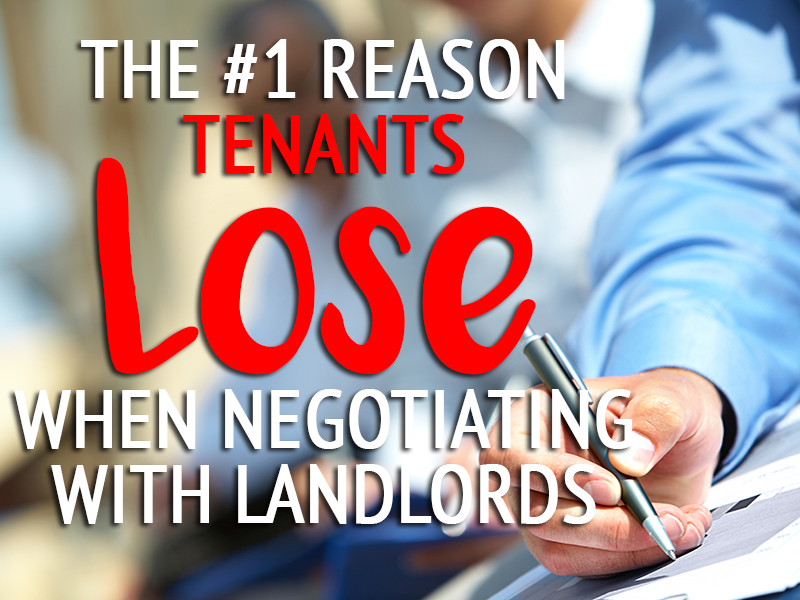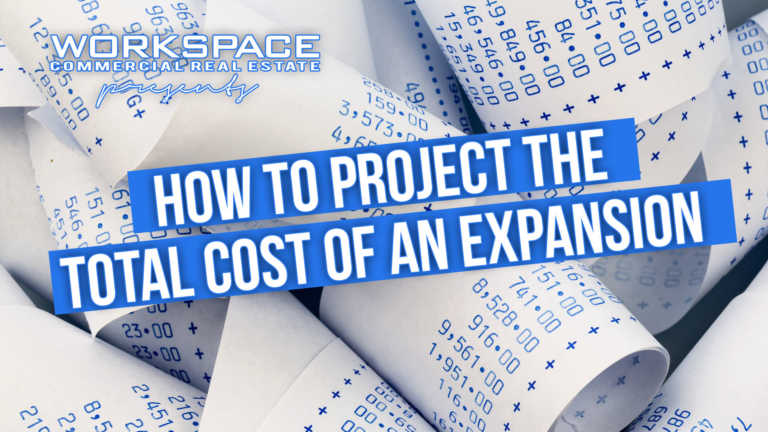The Number 1 Reason Tenants Loose in Landlord Negotiations
[fusion_builder_container hundred_percent=”yes” overflow=”visible”][fusion_builder_row][fusion_builder_column type=”1_1″ background_position=”left top” background_color=”” border_size=”” border_color=”” border_style=”solid” spacing=”yes” background_image=”” background_repeat=”no-repeat” padding=”” margin_top=”0px” margin_bottom=”0px” class=”” id=”” animation_type=”” animation_speed=”0.3″ animation_direction=”left” hide_on_mobile=”no” center_content=”no” min_height=”none”][fusion_text]For today’s topic, I want to talk about the number one reasons that tenants get beat on landlord negotiations. The number one reason that tenants get beat is quite simple. It’s fear of loss. When a landlord understands that your business is dependent on that location or if you have, let’s say you’re a print shop and you have $100,000 of equipment in that center. They understand that they have leverage over you. They understand the pains of moving. They know that 75% of tenants typically renew their lease. That puts them in a naturally advantageous position.
For a tenant, you have to think ahead of it, how can I balance the playing field here so that you can get more concessions? Because for you, if you’re a larger tenant, this can mean a difference between 50 to $200,000 in additional rent costs that you might not have to pay if you play your cards right. This is what we tell our clients. When you’re in a situation, you need to remove fear of loss from the table. I’m not encouraging you to actually move form your space, but you need to know internally and you need to allow the landlord to believe that you could actually move. That it’s a possibility if you don’t get the best deal or at least a fair deal on the space.
[/fusion_text][/fusion_builder_column][fusion_builder_column type=”1_1″ background_position=”left top” background_color=”” border_size=”” border_color=”” border_style=”solid” spacing=”yes” background_image=”” background_repeat=”no-repeat” padding=”” margin_top=”0px” margin_bottom=”0px” class=”” id=”” animation_type=”” animation_speed=”0.3″ animation_direction=”left” hide_on_mobile=”no” center_content=”no” min_height=”none”][fusion_youtube id=”https://youtu.be/1kCIRveOFUE?list=PLy0gyjqQCZayffbTbsdExOxxO-SyUu6A5″ width=”600″ height=”350″ autoplay=”no” api_params=”” class=””/][fusion_text]
Now, to avoid being confrontational, it’s important that you understand the facts. You need to understand the data in the marketplace. What’s the going rate in your building? What’re the historical trends in your building? What type of broker are you dealing with and how do they typically negotiate? There’s a bunch of different factors here that make a difference, but once you understand the broker you’re dealing with, the historical rate trends of your building, the historical trends of your market, you’re in a much better position to be able to ask for what is actually fair and equitable.
You want to start early in this process, too. I always tell my clients, start at least a year before your lease expires. Landlords don’t like this, but I’m going to tell you what it shows now. If you start a year before, they know you have plenty of time to move. If you start this process three months before your lease expires, there’s over an 85% chance that you’re gonna renew. Sure, you can threaten them and say, “Oh, I can move.” And you can, but it’s highly unlikely and those guys are pros. They’ve been in this for a long time. They hear that all the time. So, start early, know your data, know what a win looks like, then you’re able to pick the right broker to help you negotiate the deal.
Due to the nature of negotiations, things can get pretty tense. When you’re asking for concessions, that’s not an easy task. When you’re asking for the type of deal that you probably need to get in the marketplace, it’s something that can make some people feel uncomfortable. That’s what brokers are for. The landlord sure doesn’t do it themselves. They hire a broker themselves to do the exact same thing. You’re allowed that same opportunity. I always encourage people to use a broker whenever possible, so that you can push them to get things you cannot get on your own.[/fusion_text][/fusion_builder_column][/fusion_builder_row][/fusion_builder_container]







